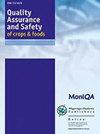2016年中国婴幼儿配方奶粉生产过程中克罗诺杆菌的污染、持续存在和传播
IF 5.3
3区 农林科学
Q1 FOOD SCIENCE & TECHNOLOGY
引用次数: 7
摘要
对2016年7月至11月期间从中国两家生产婴儿配方奶粉(PIF)的工厂采集的620份样本进行克罗诺杆菌分析。研究了克罗诺杆菌的抗菌敏感性、脉冲场凝胶电泳(PFGE)和生物膜形成情况。结果33株分离物中克罗诺杆菌阳性检出率为2.26%。除1株克罗诺杆菌对氯霉素呈中等耐药外,其余菌株对12种抗菌药物均敏感。PFGE分析显示,共鉴定出9个菌群,共33株,其中C8、C4和C5为优势型。33株菌株均能形成生物膜,其中,C. malonaticus菌株在28℃和37℃条件下均表现出良好的生物膜形成能力。结果表明,PIF制造商有必要制定控制措施,以减少克罗诺杆菌污染及其相关的食源性疾病在婴儿中。本文章由计算机程序翻译,如有差异,请以英文原文为准。
Contamination, persistence and dissemination of Cronobacter during the production of powdered infant formula in China in 2016
A total of 620 samples collected from two factories in China producing powdered infant formula (PIF) between July and November 2016 were analyzed for Cronobacter. Antimicrobial susceptibility, pulsed-field gel electropho-resis (PFGE), and biofilm formation of Cronobacter were carried out. The results showed that 2.26% samples were positive for Cronobacter among the 33 isolates that were identified. All Cronobacter isolates were susceptible to 12 antimicrobial agents tested except one isolate which showed intermediate resistance to Chloramphenicol. PFGE analysis showed that nine clusters comprising the 33 isolates were identified, among which C8, C4, and C5 were the predominant types. All 33 isolates were capable of forming biofilm, and particularly, C. malonaticus isolates showed a good biofilm-forming ability at both 28°C and 37°C. The results illustrated that it is necessary for PIF manufactures to develop control measures for reducing Cronobacter contamination and its associated foodborne illness among infants.
求助全文
通过发布文献求助,成功后即可免费获取论文全文。
去求助
来源期刊

Quality Assurance and Safety of Crops & Foods
FOOD SCIENCE & TECHNOLOGY-
CiteScore
4.60
自引率
7.50%
发文量
61
审稿时长
1 months
期刊介绍:
''Quality Assurance and Safety of Crops & Foods'' is an international peer-reviewed journal publishing research and review papers associated with the quality and safety of food and food sources including cereals, grains, oilseeds, fruits, root crops and animal sources. It targets both primary materials and their conversion to human foods. There is a strong focus on the development and application of new analytical tools and their potential for quality assessment, assurance, control and safety. The scope includes issues of risk assessment, traceability, authenticity, food security and socio-economic impacts. Manuscripts presenting novel data and information that are likely to significantly contribute to scientific knowledge in areas of food quality and safety will be considered.
''Quality Assurance and Safety of Crops & Foods'' provides a forum for all those working in the specialist field of food quality and safety to report on the progress and outcomes of their research.
 求助内容:
求助内容: 应助结果提醒方式:
应助结果提醒方式:


